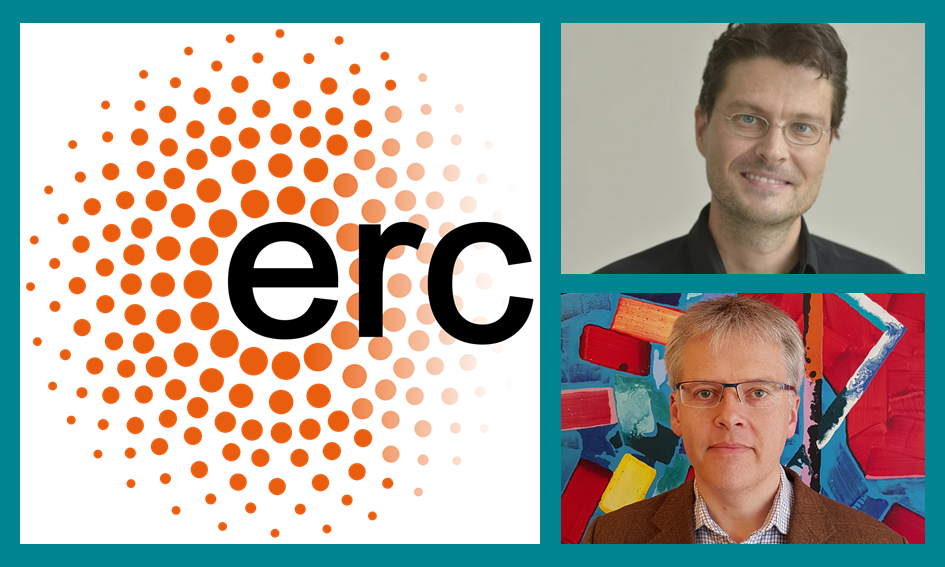ERC Advanced Grants for Peter Robin Hiesinger & Bruno Klingler

MATH+ members Peter Robin Hiesinger and Bruno Klingler receive prestigious ERC Advanced Grants.
On 22 April 2021, the European Research Council (ERC) announced which innovative research projects will be funded by the ERC Advanced Grant for established researchers. Out of 2678 proposals from across Europe and all scientific disciplines, only 209 projects (8%) were approved; these projects will be funded with in total 507 million euro over a five-year period.
Peter Robin Hiesinger: Deciphering the Growth Process of the Brain’s Neural Connections
Peter Robin Hiesinger’s project “Synaptic Promiscuity and Brain Development” (SynPromiscuity) was chosen by the ERC as one of only eight projects in the area Neuroscience and Neural Disorders—the only awarded life science project based in Berlin.
The project SynPromiscuity aims to determine where the information originates that wires up the brain. Biologists like to pitch “genes” against “learning”—nature vs. nurture. Genes encode many aspects of the brain prior to learning. But what does “encode” actually mean? Genes do not describe the connections in the brain, but they form the basis to grow a brain. But how exactly do two nerve cells find each other to form a connection in the brain? SynPromiscuity is devised to investigate the idea that nerve cells are not genetically determined to make specific contact. Instead, connections in the brain grow in a self-assembling process that is partly random, flexible, and robust.
Peter Robin Hiesinger is professor for Neurobiology at Freie Universität Berlin. Together with Max von Kleist, Steffen Prohaska, and Martin Weiser, he works on the MATH+ project EF3-2: Model-Based 4D Reconstruction of Subcellular Structures. Furthermore, Peter Robin Hiesinger is the author of the book “The Self-Assembling Brain—How Neural Networks Grow Smarter”.
Read more: MATH+ press information in English and German
Bruno Klingler: Exploring Transcendence of Periods Through Tame Geometry
The project “Tame geometry and transcendence in Hodge theory” (TameHodge) by Bruno Klingler will be funded by the ERC with more than 1.8 million euro. The project plans to attack fundamental questions in Hodge theory using tools coming from mathematical logic.
Hodge theory, as developed around the 1970s, has become the main tool for understanding the geometry and arithmetic of complex algebraic varieties, that is, solution sets of algebraic equations over the complex numbers. It can be thought as a dramatic linearisation, which associates to any complex algebraic variety a very simple object: a finite dimensional complex vector space, which encodes the periods of differential forms on the variety. At the heart of the theory lies the fundamental fact that, although Hodge’s theory produces very simple objects, it is not itself given by a simple algebraic recipe but requires transcendental operations. However, two major conjectures in mathematics, the Hodge conjecture and the Grothendieck period conjecture, predict that this transcendence is severely constrained.
Recent work of Prof. Klingler and his collaborators has shown the emergence of a spectacular link between Hodge theory and tame geometry. Tame geometry, whose possibility was suggested by Grothendieck in the 1980s and developed by logicians under the name o-minimal geometry, studies structures where every definable set has a finite geometric complexity. The goal of the project TameHodge is to show that moderate geometry is the natural framework for Hodge theory—with major applications to the transcendence of periods, atypical intersections, and non-abelian Hodge theory.
Since 2017, Bruno Klingler is professor for Algebraic Geometry at Humboldt-Universität zu Berlin; as such he is one of 20 Einstein professors. Furthermore, Prof. Klingler is a faculty member of the Berlin Mathematical School. Before moving to Berlin, Bruno Klingler was a full professor at the Institut de Mathématiques de Jussieu-Paris Rive Gauche (IMJ-PRG), Université Paris, as well as assistant professor at University of Chicago and Yale University.

